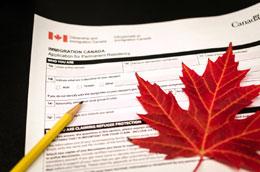What Canadians think about Asian immigration

By Fabian Dawson
New Canadian Media
A majority of Canadians think that Asian technology, immigrants, culture, and economic growth will positively impact Canada in the next 10-to-20 years, states a new study by the Asia Pacific Foundation.
The 2021 National Opinion Poll: Canada’s Generational Perspectives on Asia (2021 NOP)
which surveyed 2,592 Canadian citizens and permanent residents across the country, found that Canadians across all generations believe it is important for the nation’s future to build competency about Asian culture, society, languages, protocols and religions.
Data from Immigration, Refugee and Citizenship Canada (IRCC) show five of the top ten immigrant source countries for Canada are in Asia with India, China and the Philippines topping this list. The other two top Asian immigrant source countries are Pakistan and South Korea.
This year Canada is expecting 100,568 immigrants from India, 35,538 from China, 32,688 from the Philippines; 12,684 from Pakistan and 7,173 from South Korea, according to a report in immigration.ca.
It is part of Canada’s ambitious Immigration Levels Plan as it aims to welcome 401,000 immigrants in 2021, another 411,000 in 2022, and an additional 421,000 in 2023.
The APF Canada’s 2021 NOP also found that 70% of respondents across all age groups had too little or no exposure to Asia in high school, while 46% of respondents, who said they are interested in learning more about Asia, believe an increased emphasis on teaching about Asia in the Canadian education system would be an effective method of building Canadians’ awareness about Asians.
The poll also touched on languages and found that 13% of Canadians have conversational fluency in at least one Asian language. The majority are Canadians of Asian descent, with younger Canadians more likely to speak an Asian language than older generations.
“Canada’s younger generations are considerably more diverse than our older generations in terms of their ethnicity and lived experiences of multiculturalism,” said APF Canada President and CEO Jeff Nankivell, who helms the Vancouver-based think-tank focused on Canada’s relations with Asia
“As our latest poll shows us, these young Canadians have a heightened awareness and greater enthusiasm for engagement with Asia and Asian peoples and culture. This bodes well for Canada, as we seek to strengthen and build relationships across this growing and dynamic region.”
“Importantly, this year’s NOP also underscores the important work being done in building Asia competency here at home,” added Nankivell. “It helps identify gaps in Canadians’ awareness about Asia – and effective ways to fill those gaps to help prepare young Canadians for the changing socio-economic realities of Canada and the global economy.”
Highlights of the 2021 NOP: Canada’s Generational Perspectives on Asia include:
• 15% of all respondents self-identify as Canadian of Asian descent.
• 29% of Generation Z (18-to-24 years) identify as Canadians of Asian descent, compared to less than 6% of respondents aged 55 and above.
• Across the survey, Canadians of Asian descent report higher interest and awareness about Asian culture, languages, and current events and express warmer feelings toward Asia.
• Younger Canadians (under 34) are generally more interested in learning more about Asia, but more than 50% of all respondents say they are interested or currently engaged in learning more about Asian cuisine, history, or tourism.
• 70% of all respondents say they had too little or no exposure to Asia in their high-school education.
• Among respondents interested in learning about Asia, 46% said an increased emphasis on teaching about Asia in the Canadian education system would effectively build awareness about Asia and Asians.
• 13% of Canadians have conversational fluency in at least one Asian language.
• Among respondents who can speak an Asian language, 70% know Cantonese or Mandarin (Chinese), about 21% speak Hindi, and 15% speak Punjabi.
• When asked about languages Canadians would like to learn the most besides English or French, Chinese, including Mandarin and Cantonese (12%), and Japanese (6%) are the second and fourth top choices, behind Spanish (46%) and Italian (8%).
• 70% of Canadians think technology and innovation in Asia will positively impact Canada’s future, 62% think the same for immigration from Asia, 58% for the influence of Asian cultures and traditions on Canada, and 57% for economic growth in the Asian region.
• Almost half of Gen Z and Millennials believe it is “important” or “very important” to understand Asian society and culture for Canada’s future economic growth and social diversity, compared to about 35% of the two older generations.
• Notably, twice as many Canadians of Asian descent think understanding Asia is “important” or “very important” for Canada’s future economic growth and social diversity compared to the rest of the respondents.
Generational Differences on Effective Methods to Build Awareness About Asia/Asians
Q: In your opinion, what are some of the most effective methods that can help build Canadian awareness about Asian countries or Asians? Please select your TOP THREE methods.
|
Methods to build awareness about Asia |
All |
Gen Z |
Millennials (25-34) |
Gen X |
Baby Boomers |
|
Engage in more community/social events and activities celebrating different Asian cultures |
47% |
43% |
46% |
45% |
52% |
|
Increase emphasis on teaching about Asia in the education system (e.g. history, culture, politics, economics) |
46% |
44% |
44% |
41% |
55% |
|
More news media coverage of current affairs in Asia |
30% |
22% |
23% |
28% |
39% |
|
Have Asian languages as optional foreign languages course at school |
29% |
36% |
33% |
`32% |
20% |
|
More media coverage of Asian history, culture, and people |
27% |
22% |
22% |
24% |
35% |
|
Increase access to exchange programs as a student |
27% |
37% |
28% |
26% |
22% |
Source: APF Canada’s National Opinion Poll 2021.






